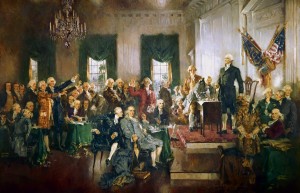
“…that they are endowed by their Creator with certain unalienable rights that among these are life, liberty and the pursuit of happiness.” Those words, written by Thomas Jefferson in 1776 would change the world in dramatic ways. The American Founding Fathers were great visionaries who stood strong for liberty and justice in the face of tyranny and oppression. However, one glaring contradiction lay amidst the justice and freedom of the Founding Fathers’ revolution: slavery. How could the Founding Fathers declare that all men are created equal when they owned slaves and supported the “peculiar institution”. As is often the case, the truth about the Founding Fathers and slavery has been missed in recent years. Were the Founding Fathers really pro-slavery?
Of course, there were some like Washington and Jefferson who did own slaves. Even these however, could hardly be called “slavish monsters”. Washington ordered that his slaves be freed upon his death. Jefferson, besides writing the Declaration of Independence which would be the groundwork for the abolition and Civil Rights movements, also proved his anti-slavery sentiments. He declared, in a deleted portion of the first draft of the Declaration of Independence, that King George III had “waged cruel war on human nature…violating its sacred rights of life and liberty” in reference to slavery. He was described by John Quincy Adams as one of the foremost Southern abolitionists. Jefferson introduced an anti-slavery bill in Virginia. Indeed, Virginia, a southern state, was the first state, North or South, to prohibit the transatlantic slave trade.
Furthermore, other Northern Founding Fathers were also radically opposed to slavery. Benjamin Franklin was an abolitionist who, in 1773, declared that “a disposition to abolish slavery prevails in North America”. It was in 1774 that Benjamin Franklin and Benjamin Rush founded the first abolitionist society. John Jay of New York, led the abolitionist movement in that state. Other prominent Founding Fathers who supported the abolition of slavery included James Madison and James Monroe, future presidents, John Marshall, future Chief Justice of the Supreme Court and Charles Carroll, a signer of the Declaration of Independence.
Eight states abolished slavery completely by 1804, three years before the transatlantic slave trade was outlawed throughout all the country in 1807. The first was Massachusetts, which passed an anti-slavery law in 1780.
The majority of the Founding Fathers were overwhelming anti-slavery. Even those who owned slaves, like Washington and Jefferson, were opposed to the institution and even did what they could to bring it to an end. The majority of America’s Founding Fathers were abolitionists and the American Revolution became the foundation on which the abolition and Civil Rights revolutions would be built. More often than not, the Founding Fathers truly believed that “all men were created equal and endowed by their Creator with certain unalienable rights, that among these are life, liberty and the pursuit of happiness.”
